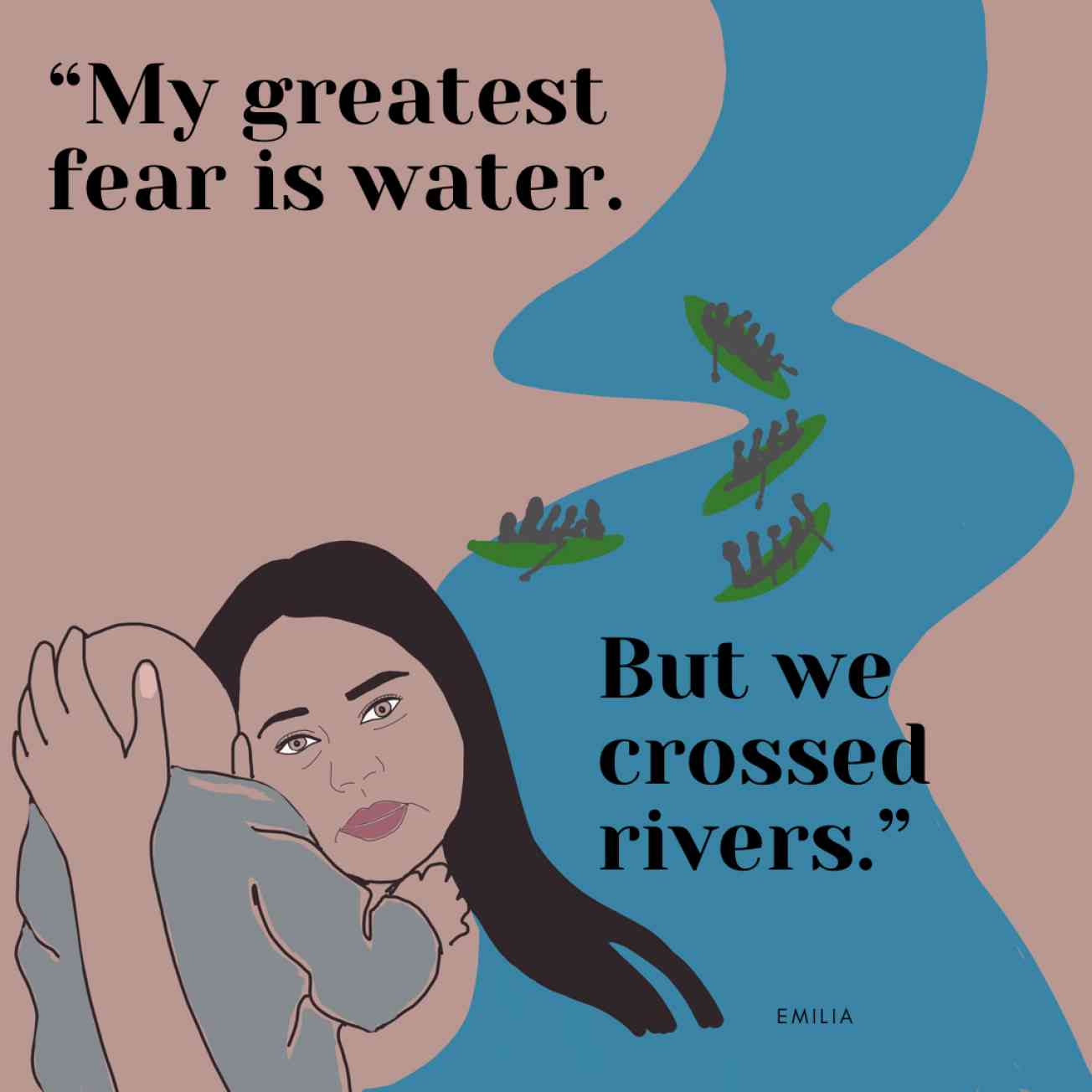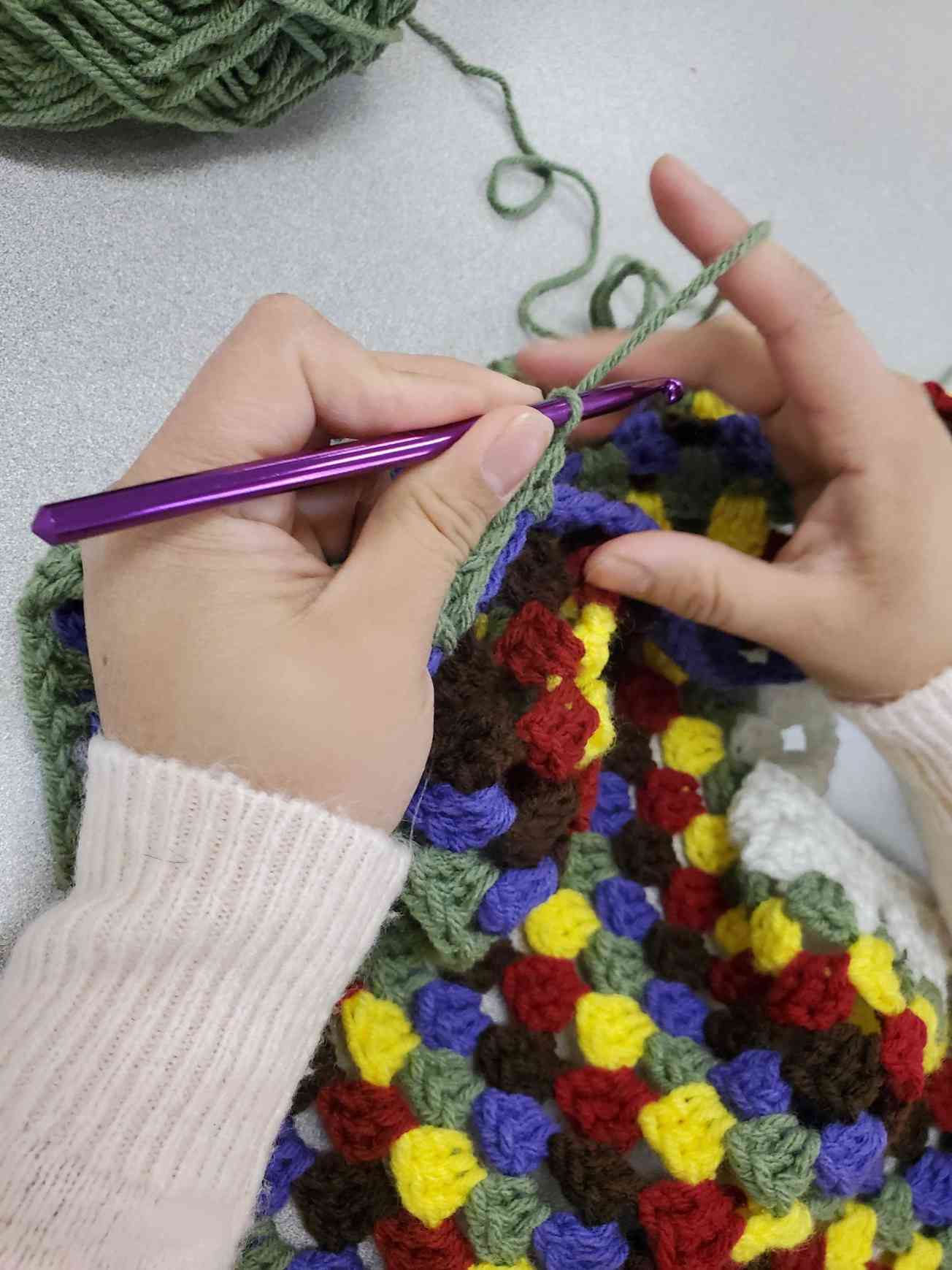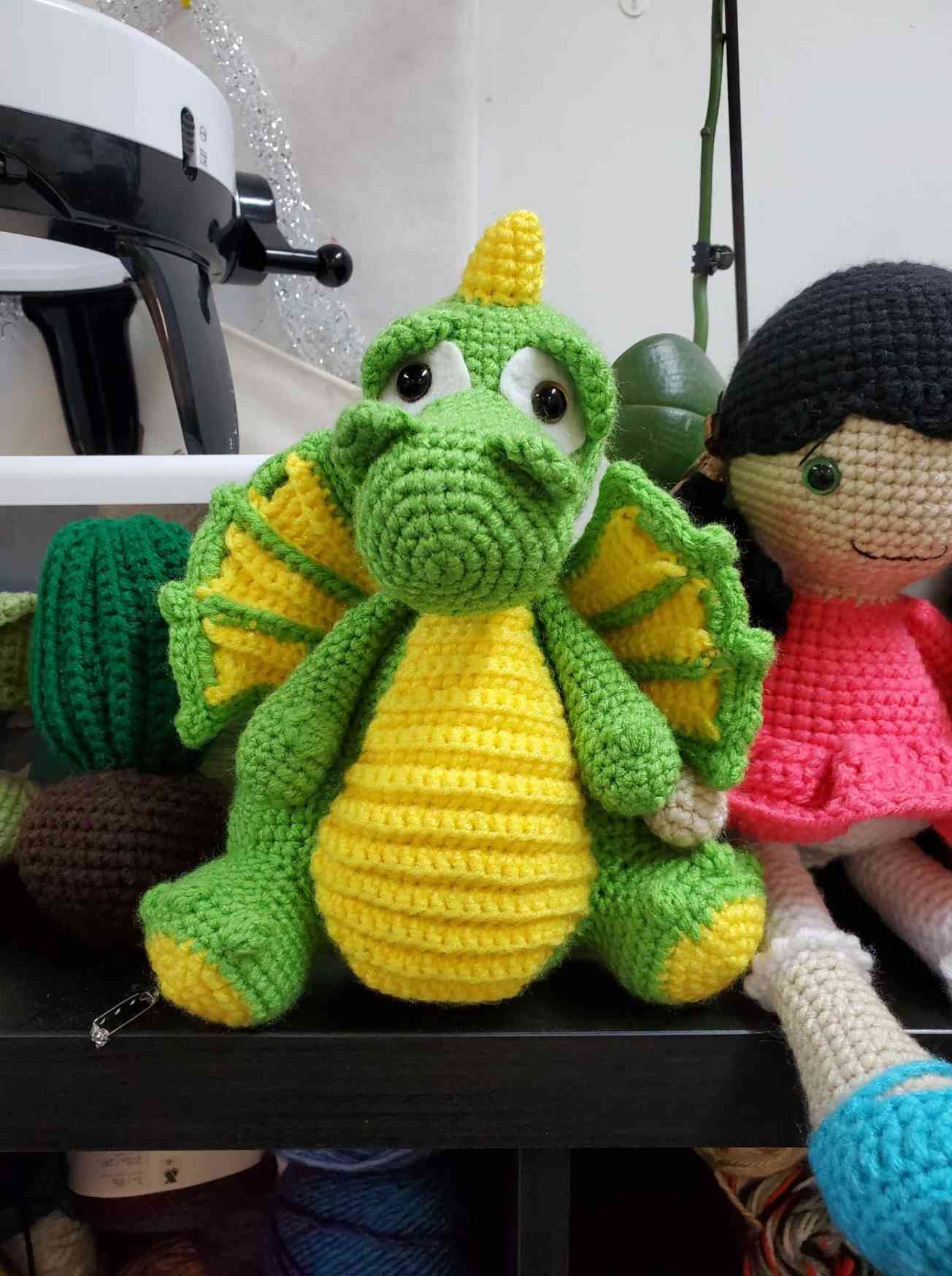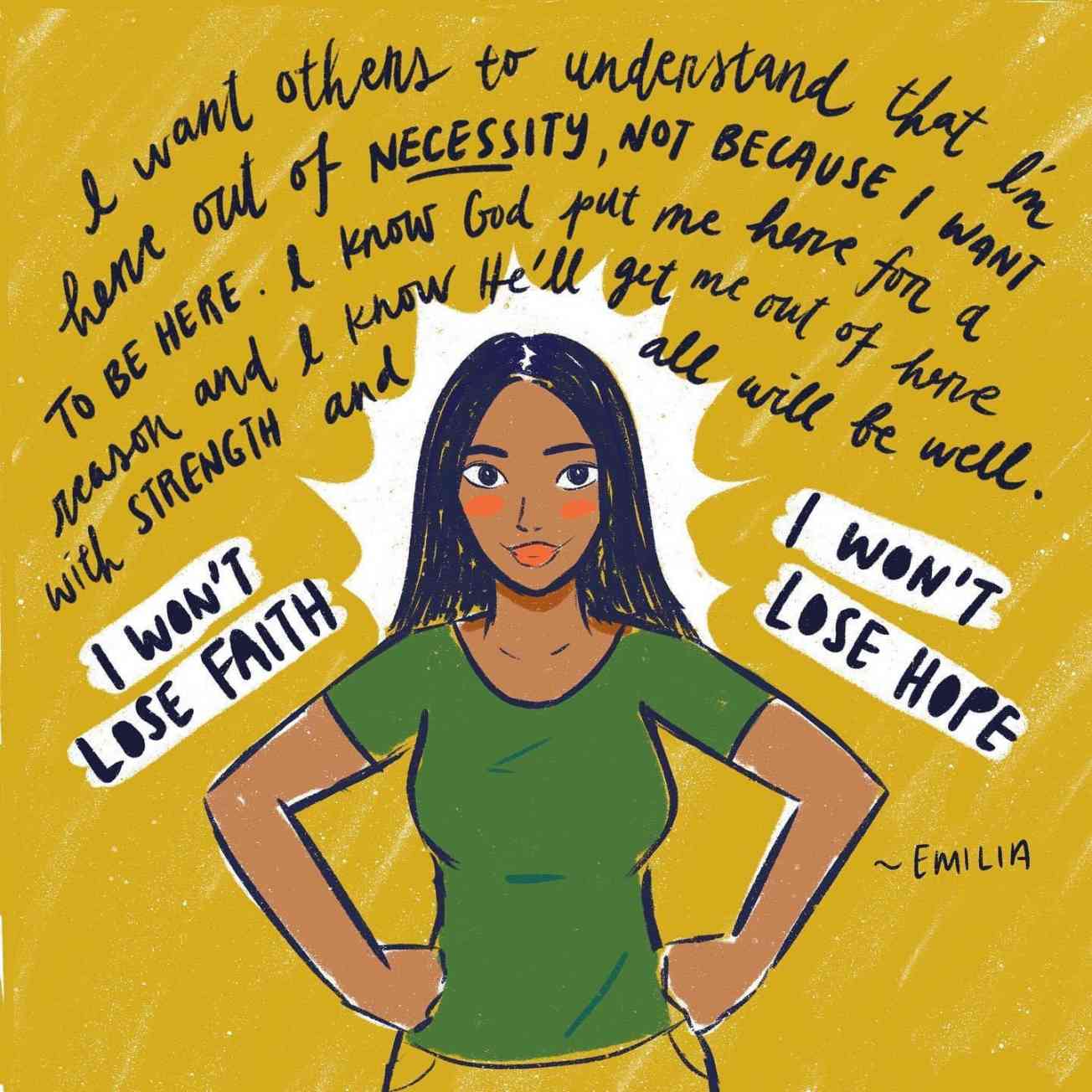Arrival: I Took Sanctuary
I Fear for my Daughter's Life and My Own

My name is Emilia. I’m from Honduras. I came to America because someone was trying to kill me and my daughter. I have been in this church since 2018.
I am from one of the most dangerous cities in the world. Not just in Honduras, in the world. That was said in the New York Times. There, the lives of women do not matter. Women are violated and assaulted. They do whatever they want to them and the police do not help them because women are not valued in Honduras.
I lived in Honduras for 27 years. I was raised by my grandparents because my parents emigrated to the United States. I was one year old when my mother left and I was three months old when my father left. After my grandparents passed away, I decided to come in 2014 to the U.S.
I started working when I was 17 because my grandfather wanted me to be independent. I managed small companies and worked in sales and accounts payable. I worked and then studied at night. I studied engineering and industrial production. I have a bachelor degree in quality control and production.
I had a hard-working life, a very active life, and that is what I loved-- interacting with people, offering products, talking, trying to convince people. I like being in constant motion. I can’t be still.
It has been hard to be in this church for three years. I have to keep my mind busy. I can’t cry in front of my daughters so I have dedicated myself to doing something all the time. I’ve learned to crochet, to knit with 2 needles. I make crochet dolls/toys. I’m always doing things, including learning English because it is very hard to learn English but I’m doing it with great desire.
My daughter was 2 1/2 when I came.
When I was pregnant with my daughter, the problems started.
I said “no, my daughter is with me and no matter what I’m going to defend and protect her.”
When my oldest daughter (who is now nine) was six months old, I began receiving constant death threats against me, but also against her. I was threatened enough to go to the police to get a restraining order and to tell them who was culpable if something happened to my daughter. But I didn’t get any help from them or anyone. It was a constant fear.
I also had the opportunity to seek visas but there are a lot of requirements. You have to have a house, a bank account, work, demonstrate you are going to return, and an endless amount of things that make it impossible to get migrant status to come with a visa to this country. So I decided to take my daughter and begin a journey by foot, in whatever way I could. I had to find a way to come to this country to protect my daughter.
I became aware that there was a group coming to the U.S. I got a call. It was on a Monday. They told me, “Emilia the people are leaving today. It’s your decision if you go or stay.” I thought, “This is the only opportunity I will have,” so I grabbed my daughter and a backpack with essentials and said, “I’m going, I’m going, I’m going.”
And with that group of people we united together. We rode buses and walked. We walked in the night with rain but it was the only chance I had to come here.
The journey took two weeks. I remember we were halfway through the journey when I started to cry saying “I can’t, I can’t with this journey.” I was carrying my daughter in my arms and I had on my back the backpack that had essentials for her but in my hands I had her life. People said to me “Emilia, don’t give up. We are halfway through. Remember you are doing this for your daughter. Pull out strength and keep going.”
Two weeks. I don’t wish it on anyone. It is a very hard journey. But we made it. My daughter is here. She is nine years old. During the journey she was two and a half and in my arms the whole time. I never gave her to anyone. Never. People asked “can we help you?” and I said “no, my daughter is with me and no matter what I’m going to defend and protect her.”

You always journey with fear.
It was terrible. Constant fear - of the police, of being kidnapped, cartels, gangs - My greatest fear is water. But we crossed river. My love as a mother gave me strength.
We were with a big group, around 50 people. We supported and guided each other. Between everyone we knew how to get there.
I arrived at the border in Laredo, Texas. I was in a detention center for five days.
The detention center was an unforgettable experience.
I don’t think it is easy to hear … there were more than 60 people in a cell. All sleeping on the floor or on a cement embankment. There was only one bathroom, and the food they gave you-- bread with cheese and one little apple. That was what we survived on. Thanks be to God that the A/C in our cell was broken. We could see from our cell that people in other cells were freezing. The only thing they give you when you are cold is a piece of aluminum paper (mylar blanket) to wrap yourself in and then you must adapt.
When you need to do your necessities, you have to do them in front of others because there is only one toilet in the cell.
We didn’t have much contact with officials only when it was time to ask for food or if I needed to ask for things for the baby like milk or bread, things like that.
My mother received a call saying they had me in the detention center. She was afraid. They asked if she would be responsible for me. She said yes. I had to sign some papers.
From Texas I traveled two days on a bus to get to Utah where my parents live.
My goal was to come to the U.S. to find my parents so I could have their support. I had no one else after my grandparents died. My grandfather died when I was four months pregnant.
I got off the bus and saw my mother for the first time in 27 years.
We arrived in the middle of the night. I got off the bus and saw my mother for the first time in 27 years. My baby looked at her and said “grandma” and threw herself at her. I hugged my mother and my little sister. It was a dream come true, to see my parents after 27 years and to know that I had arrived in a country where I could protect my daughter and have the support of my parents.
I devoted myself to enjoying my family and getting to know my siblings. I couldn’t work because they did not give me a work permit. I depended on the support of my siblings who helped me with the baby and the church who supported me at that time.
I had a year to present my asylum case, but unfortunately, I was badly advised by worthless lawyers. My case was lost through bad representation. It is their fault that I am here fighting because the work they did was very bad, very bad.
When I lost my case and the lawyer filed an appeal, we had not yet received a reply about the appeal when immigration ordered my deportation.
They ordered me to go. “You have to go. You have your tickets. You are deported.” And I said “but I have a case pending.” They wouldn’t wait for the reply on my case. They didn’t care.
The lawyer had requested an emergency stay of removal so I thought maybe when I’m at the airport they’ll call and say “Emilia, they’ve accepted your stay of removal because you have a case pending.” So at 5 in the afternoon they told me no, it was turned down completely.
I was with my mother saying my goodbyes when I learned I was denied. I didn’t know what to do. What was I going to do in Honduras where death awaits me and my daughter?
I called the church, and asked if they would offer us sanctuary. I wanted to protect my daughter. They told me yes, the church was amenable to receiving me and giving me sanctuary. So instead of going to the airport I came to the church. I grabbed my daughters and came to the church and here I’ll stay until I can guarantee protection for my daughter. Because I’d rather be locked behind the doors of the church than to put one foot in Honduras where my life has no value, and my daughters’ lives have even less.

I’d rather be locked behind the doors of the church than to put one foot in Honduras where my life has no value, and my daughters’ lives have even less.

I was not a member of the church when they decided to open their doors to me.
My first night in the church I was in my room crying, crying, crying from nerves and worried about what was going to happen. The next day I stayed in my room all day, until someone knocked on my door and said, “Emilia, you can come out. You are safe in the church. You can come out.” And I said, “are you sure?” and they said, “yes, we are going to show you the church.” And I said “really?” But I was always nervous. I never imagined I would be here almost three years later.
Now, I wake up, and have a little cup of coffee. That is what my grandparents taught me, a little cup of coffee in the morning. My mother too. Without coffee we have no life, no tranquility.
I fix the girls breakfast. My older daughter is doing her classes online. I prepare her. She has a room where she is doing her classes. I take care of the baby, study English, and correspond through email trying to figure out how to get out of here. Or I do projects. At this moment, I make masks because people need more masks. I’m always busy. I say a busy mind doesn’t think stupid thoughts.
It has been a year since I put together a knitting group at the church. I have people who come every Saturday to knit with me, to learn. We are teaching and sharing. I make hats, scarves, masks, tamales. I do it all. My room looks like a Michael’s or a Joann’s store. I’m happy with my needles.
I also have a large kitchen here where I love to cook. I’m happy in the kitchen. In fact, this past Saturday was the baby’s birthday and we had dinner here with my mother and siblings.
The problem is when I need something I have to ask for one of the volunteers to go to the store for me or to ask around -- “who can go to the store?” They are wonderful but I have to depend on others for everything.
Still, I’m always here ready to help people. When other mothers of families feel discouraged I tell them to call me, let’s cry together. Let’s counsel each other.

It is hard for my girls not to leave here. At the beginning, after we had been here a year, the oldest was seven, she’d say “when are we leaving here?” And I’d say “soon” and she’d say “when is soon? You are always saying soon. I want to go shopping with you, go to the store.” We can’t do anything. We are dependent for everything. She’d say “Mami, I don’t want to be here.” I’d say, “we have no other option, we have to be here until we get a solution.” And so because of that I now have various volunteers who come play with them so they aren’t thinking. It is hard to be enclosed. This isn’t a life for them either but it is better here than Honduras.
I fear that they are watching us. If I were to leave the church, immigration has said they would deport me so it’s better I never leave. It scares me. It scares me to even put one foot out.
I want to finish studying. In my country I was an industrial production engineer. I began that career because it had numbers. I don’t like to read. I’m bad at it. But I love numbers. So I want to study, something to do with accounting, or taxes, something to do with numbers. I also thought about doing something with law to study and help people like me but I think that is a difficult career.
When I was reading about it, it said you have to read long reports and then do long reports and I thought, “that is not for me.” I’ll help people like me in some other way. Counseling them, supporting them, or helping them find people who can help them. But reading and writing reports, no thanks. Better with numbers for me.
I want to see my daughters studying. My oldest daughter wants to be a veterinarian. I’ll have to work hard to help her reach her dreams. The little one likes to play doctor all the time. She gives me magic kisses to cure me, she says. I have to see them achieve it. It must do all that is possible to help them be what they want to be.
Hopefully the government will take this country out of its current way of being. There is so much violence and racism and criticism of immigrants. They criticize us terribly. But I have faith that the next year will be a year of blessing to all. To all including all who are in sanctuary. There are more than fifty families living in churches. The only thing I want is my freedom and the freedom of all because this is no way of life for us. This is no way of life.
Our team members obtain informed consent from each individual before an interview takes place. Individuals dictate where their stories may be shared and what personal information they wish to keep private. In situations where the individual is at risk and/or wishes to remain anonymous, alias names are used and other identifying information is removed from interviews immediately after they are received by TSOS. We have also committed not to use refugee images or stories for fundraising purposes without explicit permission. Our top priority is to protect and honor the wishes of our interview subjects.